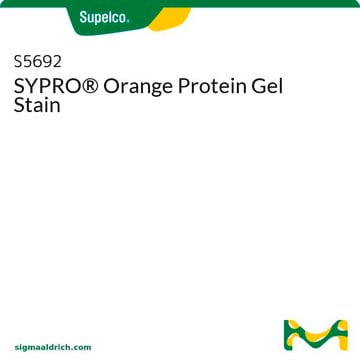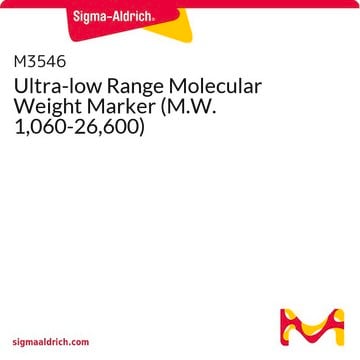G1041
EZBlue™ Gel-Färbungsreagenz
Synonym(e):
protein gel stain, protein stain
About This Item
Empfohlene Produkte
Allgemeine Beschreibung
Anwendung
Leistungsmerkmale und Vorteile
- Vorgemischte Lösung eliminiert die Zeit und den Arbeitsaufwand für die Färbelösungsherstellung
- Erhöhte Empfindlichkeit sorgt dafür, dass Proteine in geringen Mengen ??nachgewiesen werden können (schon 5 ng)
- Schnelle Reaktion reduziert die benötigte Zeit für die Färbung und das Spülen signifikant.
- Kein Lösungsmittelabfal, Sie sparen Zeit und Geld durch den Wegfall der Gefahrstoffentsorgung
Sonstige Hinweise
Rechtliche Hinweise
Ähnliches Produkt
Signalwort
Warning
H-Sätze
Gefahreneinstufungen
Eye Irrit. 2 - Met. Corr. 1 - Skin Irrit. 2 - STOT SE 2
Zielorgane
Eyes,Central nervous system
Lagerklassenschlüssel
8A - Combustible corrosive hazardous materials
WGK
WGK 2
Flammpunkt (°F)
Not applicable
Flammpunkt (°C)
Not applicable
Persönliche Schutzausrüstung
Faceshields, Gloves, Goggles, type ABEK (EN14387) respirator filter
Analysenzertifikate (COA)
Suchen Sie nach Analysenzertifikate (COA), indem Sie die Lot-/Chargennummer des Produkts eingeben. Lot- und Chargennummern sind auf dem Produktetikett hinter den Wörtern ‘Lot’ oder ‘Batch’ (Lot oder Charge) zu finden.
Besitzen Sie dieses Produkt bereits?
In der Dokumentenbibliothek finden Sie die Dokumentation zu den Produkten, die Sie kürzlich erworben haben.
Kunden haben sich ebenfalls angesehen
Unser Team von Wissenschaftlern verfügt über Erfahrung in allen Forschungsbereichen einschließlich Life Science, Materialwissenschaften, chemischer Synthese, Chromatographie, Analytik und vielen mehr..
Setzen Sie sich mit dem technischen Dienst in Verbindung.












